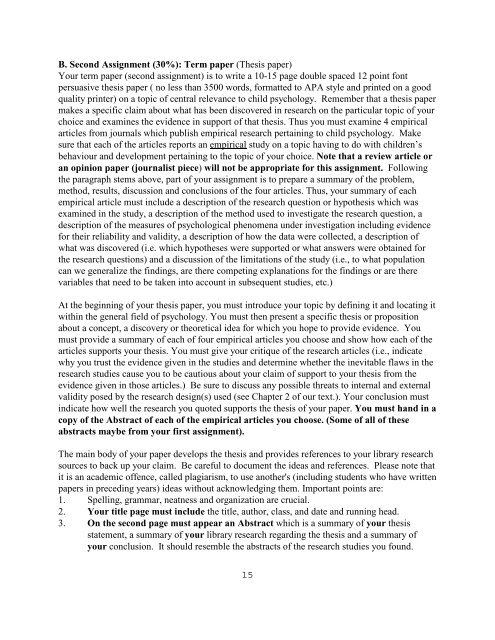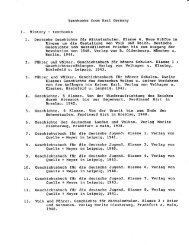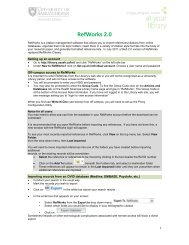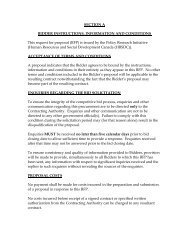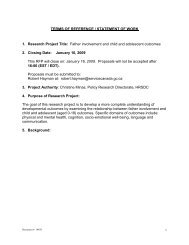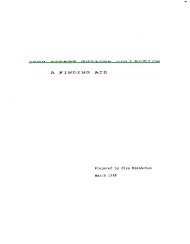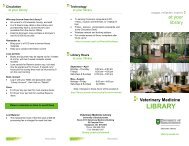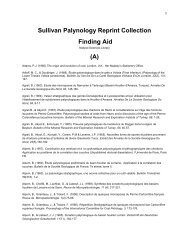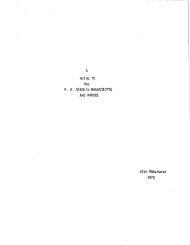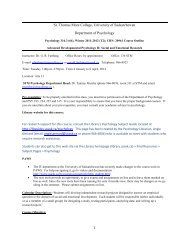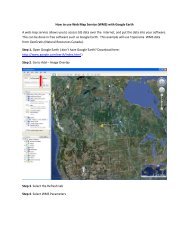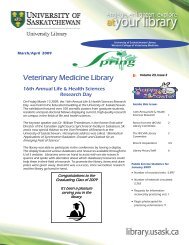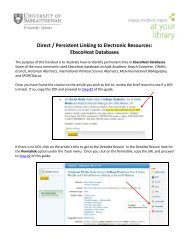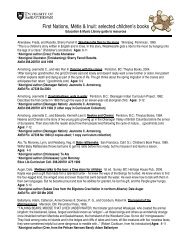T1 - University Library - University of Saskatchewan
T1 - University Library - University of Saskatchewan
T1 - University Library - University of Saskatchewan
Create successful ePaper yourself
Turn your PDF publications into a flip-book with our unique Google optimized e-Paper software.
B. Second Assignment (30%): Term paper (Thesis paper)<br />
Your term paper (second assignment) is to write a 10-15 page double spaced 12 point font<br />
persuasive thesis paper ( no less than 3500 words, formatted to APA style and printed on a good<br />
quality printer) on a topic <strong>of</strong> central relevance to child psychology. Remember that a thesis paper<br />
makes a specific claim about what has been discovered in research on the particular topic <strong>of</strong> your<br />
choice and examines the evidence in support <strong>of</strong> that thesis. Thus you must examine 4 empirical<br />
articles from journals which publish empirical research pertaining to child psychology. Make<br />
sure that each <strong>of</strong> the articles reports an empirical study on a topic having to do with children’s<br />
behaviour and development pertaining to the topic <strong>of</strong> your choice. Note that a review article or<br />
an opinion paper (journalist piece) will not be appropriate for this assignment. Following<br />
the paragraph stems above, part <strong>of</strong> your assignment is to prepare a summary <strong>of</strong> the problem,<br />
method, results, discussion and conclusions <strong>of</strong> the four articles. Thus, your summary <strong>of</strong> each<br />
empirical article must include a description <strong>of</strong> the research question or hypothesis which was<br />
examined in the study, a description <strong>of</strong> the method used to investigate the research question, a<br />
description <strong>of</strong> the measures <strong>of</strong> psychological phenomena under investigation including evidence<br />
for their reliability and validity, a description <strong>of</strong> how the data were collected, a description <strong>of</strong><br />
what was discovered (i.e. which hypotheses were supported or what answers were obtained for<br />
the research questions) and a discussion <strong>of</strong> the limitations <strong>of</strong> the study (i.e., to what population<br />
can we generalize the findings, are there competing explanations for the findings or are there<br />
variables that need to be taken into account in subsequent studies, etc.)<br />
At the beginning <strong>of</strong> your thesis paper, you must introduce your topic by defining it and locating it<br />
within the general field <strong>of</strong> psychology. You must then present a specific thesis or proposition<br />
about a concept, a discovery or theoretical idea for which you hope to provide evidence. You<br />
must provide a summary <strong>of</strong> each <strong>of</strong> four empirical articles you choose and show how each <strong>of</strong> the<br />
articles supports your thesis. You must give your critique <strong>of</strong> the research articles (i.e., indicate<br />
why you trust the evidence given in the studies and determine whether the inevitable flaws in the<br />
research studies cause you to be cautious about your claim <strong>of</strong> support to your thesis from the<br />
evidence given in those articles.) Be sure to discuss any possible threats to internal and external<br />
validity posed by the research design(s) used (see Chapter 2 <strong>of</strong> our text.). Your conclusion must<br />
indicate how well the research you quoted supports the thesis <strong>of</strong> your paper. You must hand in a<br />
copy <strong>of</strong> the Abstract <strong>of</strong> each <strong>of</strong> the empirical articles you choose. (Some <strong>of</strong> all <strong>of</strong> these<br />
abstracts maybe from your first assignment).<br />
The main body <strong>of</strong> your paper develops the thesis and provides references to your library research<br />
sources to back up your claim. Be careful to document the ideas and references. Please note that<br />
it is an academic <strong>of</strong>fence, called plagiarism, to use another's (including students who have written<br />
papers in preceding years) ideas without acknowledging them. Important points are:<br />
1. Spelling, grammar, neatness and organization are crucial.<br />
2. Your title page must include the title, author, class, and date and running head.<br />
3. On the second page must appear an Abstract which is a summary <strong>of</strong> your thesis<br />
statement, a summary <strong>of</strong> your library research regarding the thesis and a summary <strong>of</strong><br />
your conclusion. It should resemble the abstracts <strong>of</strong> the research studies you found.<br />
15


